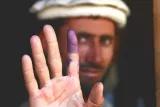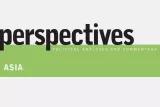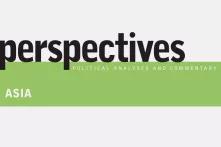In Afghanistan, corruption affects people’s lives in many ways. In an interview, Yama Torabi, Director of the Afghan NGO Integrity Watch Afghanistan, criticizes the international perception that corruption is an inherent aspect of Afghan culture. There are alternatives howerer.
Heinrich-Böll-Foundation: A nationwide survey by Integrity Watch Afghanistan (IWA) showed that Afghan’s citizens consider corruption, in its many forms and manifestations, as the third most important problem in the country. How does corruption directly affect the lives of Afghan citizens? Are there corrupt practices that are tolerated by the public?
Yama Torabi: Corruption affects people’s lives in many ways. The predominant area where corruption is felt to be most harmful is probably in the delivery of basic public services. For almost every little thing a citizen could demand from a state, be it an ID card, driving license or any other document, you will have to pay a bribe. This is causing many problems for the average Afghan in that a lot of these things become inaccessible. The numbers are shocking: around one billion USD get ‘lost’ in the maelstrom of corruption, in a country with a GDP of 14-16 billion USD this is a lot.
Land distribution and real estate is a highly corrupted sector in Afghanistan, but this is happening beyond what is visible to most people. Land is a political issue which is being fought out by the political and economic elites and requires much higher transactions. However, this does not mean that the ordinary Afghan is not touched by this form of corruption; in fact it increases the dilemma of the poor people in the country, because they become dependent on someone else and have no chance to obtain their own patch of land.
Another important issue is that of the price for oil or petrol. In Afghanistan, a liter of petrol costs around one US dollar which is almost the same price as in Europe. The difference here in Europe is that you deduct 60-80% of taxes from it, while in Afghanistan we don’t. So we have to ask: where is the money going, into whose pockets? The price at least is paid by the ordinary citizen who often does not have a choice when he needs oil for heating, for his or her generator to produce electricity, to drive a vehicle and many other needs. But due to the oil monopolies in Afghanistan, there are people making big business on the one side and people paying but not benefitting at all on the other.
There is a strong ambivalence towards corruption as is the case for many other moral issues in every society. We strongly oppose to corruption and denounce it heavily on the one hand, but at the same time we tolerate and accept it. So it really depends on the context in which you find yourself. Imagine you need to get a driving license because there is no other work opportunity for you on the market at the moment, and the custom is to pay a bribe for it. Well, you will not be left with any other chance than to pay the bribe and hence support corruption in order to get what you want. Furthermore, you will not be judged by anyone for having paid the bribe because it is the custom and you can justify it on moral and practical grounds. You can even justify it on Islamic grounds, by which you are allowed to take a ‘short cut’ in order to survive. So yes, in that sense it is tolerated in the society, but at the same time there is a strong condemnation against bribery.
Which form of corruption do you consider to be the most serious and most obstructive for the development in Afghanistan?
The sector which I think is becoming increasingly important and vulnerable to corruption is that of natural resources. The mining sector needs particular mentioning as we need to beware of future consequences that can arise if we don’t start acting responsibly today. The way mines are exploited now will have a huge environmental impact and worsen living conditions in the long run. This topic has been ignored in official politics for too long and environmental awareness is a very new concept in Afghanistan.
Also, there have been more pressing issues in the past, like war, which is usually a more immediate concern than sustaining the environment. What we need to keep in mind, however, is that the war is driven by environmental issues and it will play a central role in the future of the country. If we don’t pay sufficient attention to what is happening with our natural resources this will one day lead to frustration among the people over how the country’s resources are managed and the negative impact it will have on their livelihoods. Furthermore, there is steady competition between the elites to be in control of natural resources which can quite possibly provoke further conflicts.
What is currently being done to prevent a potential conflict over natural resources?
Natural resource management in Afghanistan involves different institutions. There are two institutions where I think we can mark good progresses, the National Environmental Agency (NAE) and the Ministry of Mines. Unfortunately, the NAE is politically still very weak. The Ministry of Mines, however, has gone through a good reform process which today allows for more transparency in their work processes and increased focus on raising awareness for environmental issues as a consequence of mining. Despite the progress that has been made, the main concern in all aspects is political instability. Generally speaking, there is a lack of trust in the institutions. The trust is instead often projected onto few committed individuals in these institutions, but in the long run it is the institutions that will remain, not the individuals.
In your opinion, how does the international community contribute to the corruption problem?
This is indeed a very important issue. What we struggle most with, in my view, is the lack of accountability for funds from the international community. Apart from the civilian state agencies a great share of funds for reconstruction work in the PRTs derives from the international military forces. We have often observed that the funds through this channel are being spent rather uncontrolled and catering for impunity. Many cases have revealed corruption at local levels where the military has tried to ‘buy’ social peace, by paying a bribe to community leaders for their individual support in protecting the area around the PRT basis. Handing out money without checks and balances can easily create tensions between communities, whilst some benefit from it and others do not get anything.
The international military forces have maintained the perception that corruption is an inherent aspect of Afghan culture, as if Afghans were a bunch of fatalists and there exists no other alternative. This view is highly destructive, in my opinion, as it sabotages all efforts that are being undertaken to combat corruption. Karzai is right in repeatedly highlighting the problem of corruption within international aid funds, most predominantly seen in the budget of ISAF. ISAF are contributing strongly to the circular flow of money into the hands of the wrong people, be it warlords, government officials or even the Taliban. Paradoxically, a large proportion of the Taliban’s finances is being provided by the international military forces.
What approaches exist to combat corruption? Which strategy is being followed by the government and how do you assess its effectiveness?
The first real effort of the Afghan Government to look into corruption and implement policies to prevent it was in 2004 with the setting up of the General Independent Anti Corruption Agency (GIAC). This organization existed for some time but had obvious limitations in acting as an investigative authority and was subject to strong political bias. After it was made public that the executive director of the agency was a former drug dealer and sentenced to jail in the US, the Afghan Government not only sacked him but dismantled the entire organization.
After the Paris Conference on Afghanistan in 2008, the Afghan Government was under massive international pressure to establish another body with an independent mandate to monitor all government actions. The result has been the establishment of the High Office of Oversight (HOO) which has a higher mandate than the government but unfortunately, their profile is still very low. The major efforts of the HOO so far have been the introduction of preventive measures, such as asset declaration and simplification of the procedures to access public services; however, they haven’t marked major progress so far.
In April 2011, the Afghan government has finally set up a joint Afghan-international committee for thorough monitoring and evaluation of the devolution of funds every three months. Personally, I don’t have a lot of hope and expectations that these agencies or committees are going to make significant difference because the crucial ingredient - and that is political will - is missing in all of these processes. Political will does not depend on Karzai alone, but on the entire political class in the country and there needs to be an engine that generates the political will – but at the moment there are no such dynamics in Afghanistan.
How are government implemented anti-corruption policies perceived by the citizens? What is their impact on how Afghans view the state?
For the time being, there is absolutely no trust between the people and the government, and accordingly, the citizens do not believe in the anti-corruption efforts of the government. This is the predominant perception that people have about the state.
What gaps exist in current anti-corruption efforts, and what are potential avenues for change?
The biggest problem we have in fighting corruption, not only in Afghanistan but around the world, is that it is too often perceived as a technical problem. However, it is not a technical problem, it is a political and social problem and hence we need to try to find solutions elsewhere. If you want to reform the government it is not enough to hire a technical agency and expect it to make the necessary changes. Reform of the government can only happen if one is willing to make political compromises, but this is still absent in Afghanistan.
Which role does your organization Integrity Watch Afghanistan play in the efforts to reduce corruption?
Integrity Watch Afghanistan (IWA) is a comparably small organization, and we can only contribute in small steps to fight corruption, but we try to do so with concrete measures. One of our areas of work is of course to call people’s attention to the issues of corruption and lobby for changes in politics. More specifically, however, we try to look into ways to improve accessibility to and efficiency of public services and how the correct spending of funds in infrastructure projects can be guaranteed. Infrastructural problems remain huge in Afghanistan, despite two thirds of the international aid money assigned to it – at least in nominal terms. But in reality, a lot of contractors disappear with the money given to them without completing the projects, leaving behind safety risks for the public and lost funds – this is what we try to change by encouraging communities to monitor these projects. Whenever they observe a problem within a project they either find solutions to resolve it by themselves or they are being assisted by IWA and our partners. These can range from government bodies and the media to donor agencies and in cooperation we manage to find several leverage points.
I think by working with the communities we can make an important contribution to the developments. Working with the government is quite challenging, but in cooperation with the society we can actually achieve something, because promoting transparency and accountability makes sense to the people. We have for example been working on the mining issue in cooperation with the Extractive Industries Transparency Initiative (EITI), and now the government is trying to provide insight to the processes, such as bidding and evaluation. This is certainly an area where we can mark great progress, but there is a lot to do and major challenges are still ahead of us.
What is your personal perspective on Afghanistan’s future, especially after 2014?
I think so far, one of the most important questions about Afghanistan’s future has been widely ignored: while we keep talking about the military strategy, there is little consensus about a political strategy for the country. The official discourse is that Afghanistan is now a sovereign country with an elected government and so on. At the same time, however, the last elections were accused to have been subject to fraud, hence the legitimacy of the government is being questioned – this means that the conditions for national sovereignty and the legitimacy of the government to act on behalf of the people are not at all given.
The military withdrawal from Afghanistan will have serious consequences for the economic situation; I expect the country to fall into an economic crisis as soon as the bulk of international military has been withdrawn, because their budget accounts for almost the entire GDP of the country. The economy is very weak and underdeveloped, with the consequence that a lot of trade is illegal; in the end, we are a war economy with the black economy by far exceeding the legal economy in Afghanistan.
Yama Torabi is Director of the Afghan NGO Integrity Watch Afghanistan.


